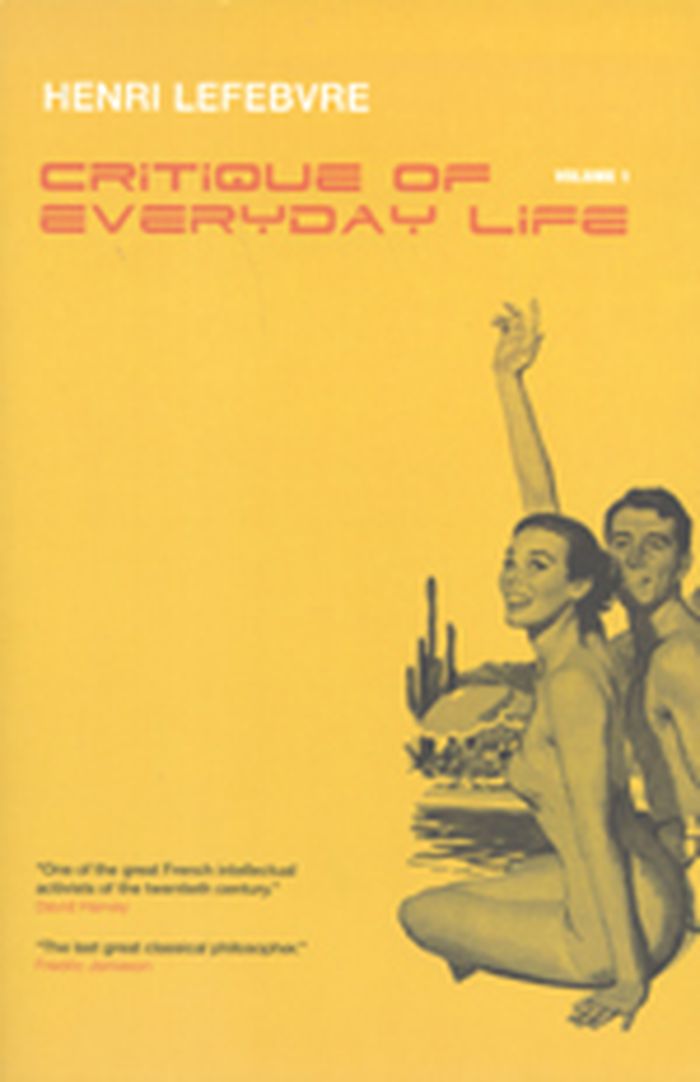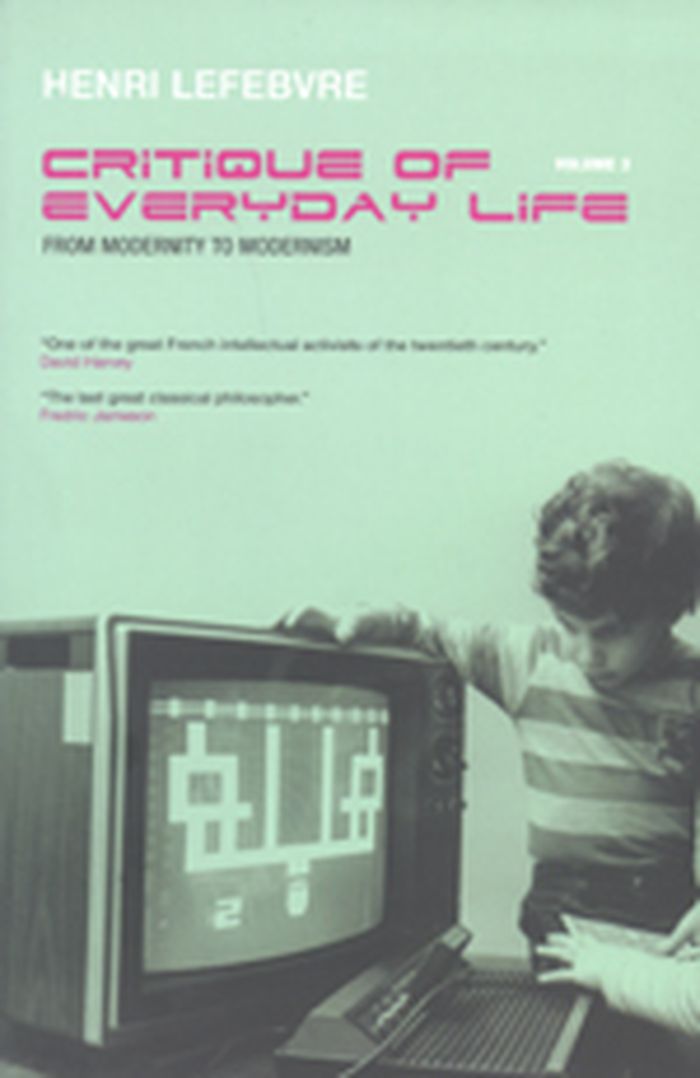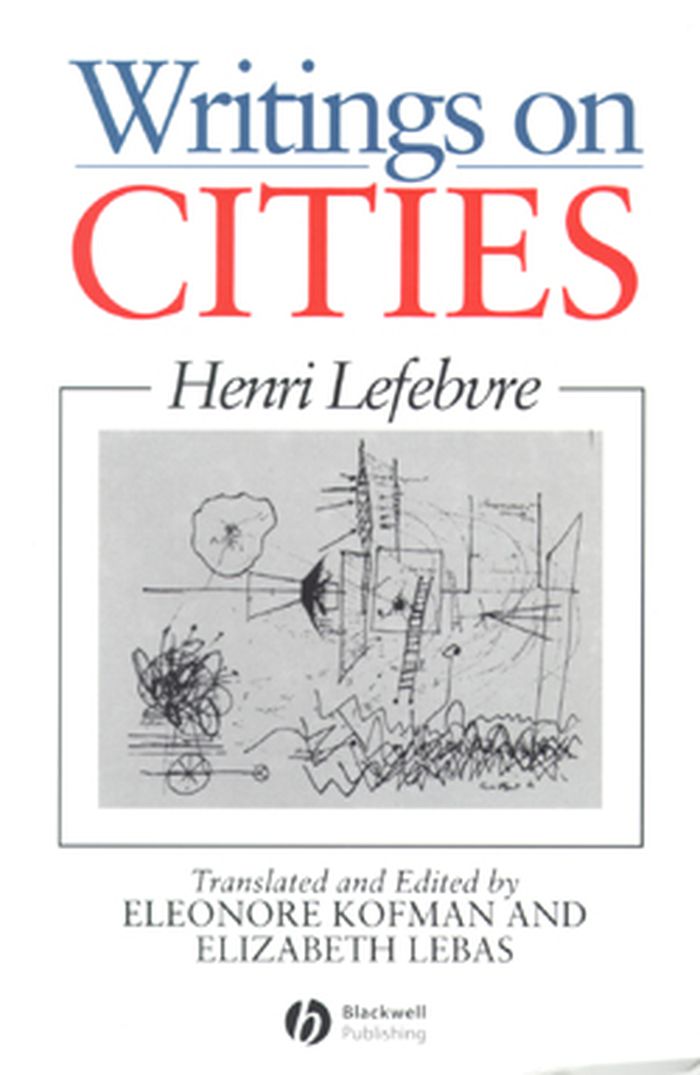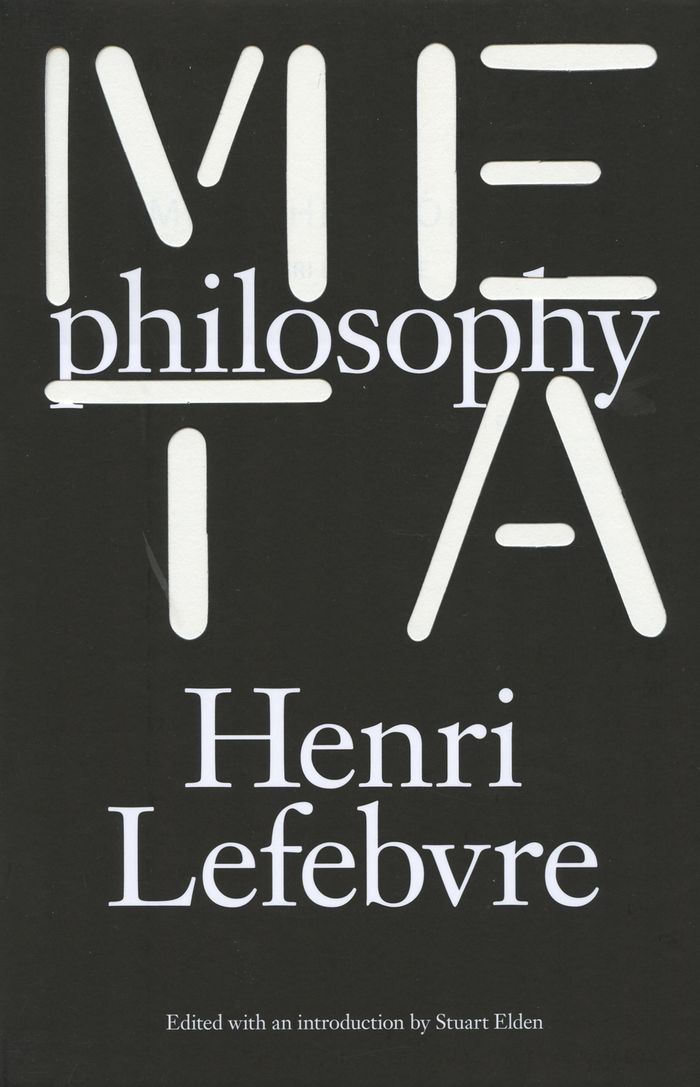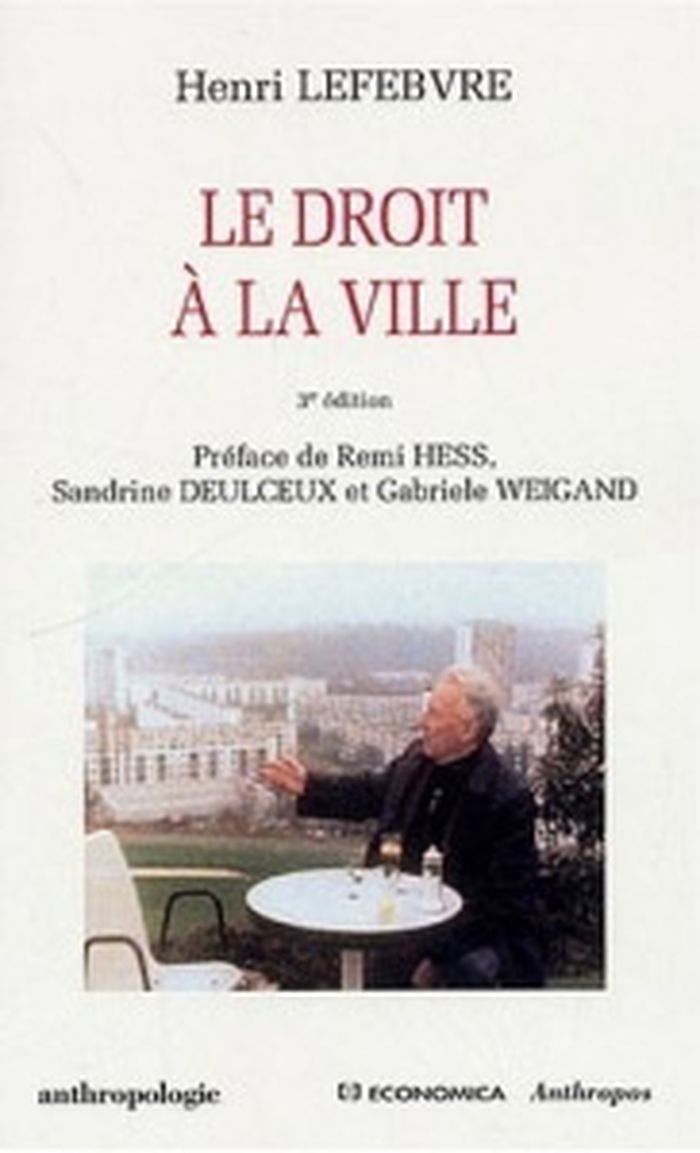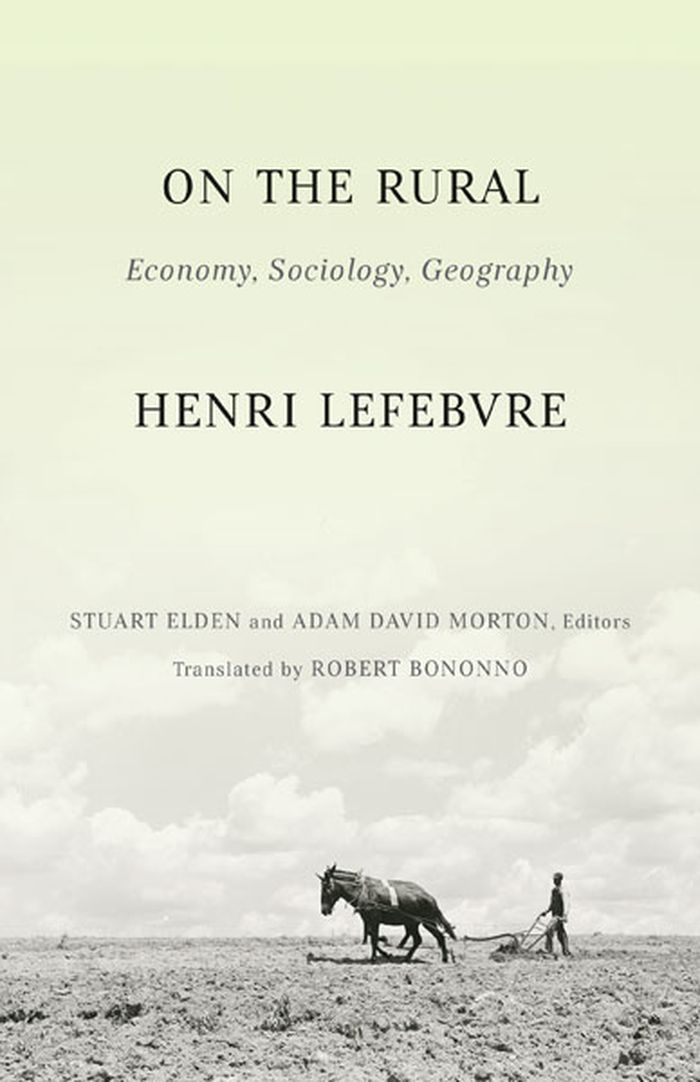L'idéologie structuraliste
$14.95
(disponible sur commande)
Résumé:
« Le structuralisme, c'est l'idéologie d'une période où la pratique s'inspire du concept de structure dans les cadres du mode de production et de rapports sociaux de production déterminés. La pratique sociale est aussi une pratique politique: celle de l'État. » Henri Lefebvre
L'idéologie structuraliste
Actions:
Prix:
$14.95
(disponible sur commande)
Résumé:
« Le structuralisme, c'est l'idéologie d'une période où la pratique s'inspire du concept de structure dans les cadres du mode de production et de rapports sociaux de production déterminés. La pratique sociale est aussi une pratique politique: celle de l'État. » Henri Lefebvre
Théorie de l’architecture
$35.00
(disponible sur commande)
Résumé:
The Critique of Everyday Life is perhaps the richest, most prescient work by one of the twentieth century's greatest philosophers. The trilogy which provided the philosophy behind the 1968 student revolution in France, it is considered to be the founding text of what we now know as cultural studies. Whether discussing sport, household gadgets, the countryside, surrealism,(...)
Critique of Everyday Life volume 1
Actions:
Prix:
$35.00
(disponible sur commande)
Résumé:
The Critique of Everyday Life is perhaps the richest, most prescient work by one of the twentieth century's greatest philosophers. The trilogy which provided the philosophy behind the 1968 student revolution in France, it is considered to be the founding text of what we now know as cultural studies. Whether discussing sport, household gadgets, the countryside, surrealism, Charlie Chaplin or religion, Lefebvre always concentrates on the minutiae of lived experience in work and leisure, daydreams, and festivities. Denounced by both the right and left when it was first published in France in 1947, today this text is recognized as a path-breaking, radical, and hugely influential book. Volume 3, From Modernity to Modernism (Towards a Metaphilosophy of Daily Life), explores the crisis of modernity and the decisive assertion of technological modernism.
Théorie/ philosophie
$33.00
(disponible en magasin)
Résumé:
"The more needs a human being has, the more he exists," quips Lefebvre in a savage critique of consumerist society, first published in 1947. The French philosopher, historian and Marxist sociologist, who died this summer at age 90, meditates on the dehumanization and ugliness smuggled into daily life under cover of purity, utility, beauty. He deconstructs leisure as a(...)
Critique of everyday life volume 2
Actions:
Prix:
$33.00
(disponible en magasin)
Résumé:
"The more needs a human being has, the more he exists," quips Lefebvre in a savage critique of consumerist society, first published in 1947. The French philosopher, historian and Marxist sociologist, who died this summer at age 90, meditates on the dehumanization and ugliness smuggled into daily life under cover of purity, utility, beauty. He deconstructs leisure as a form of social control, spanks surrealism for its turning away from reality, and attempts to get past the "mystification" inherent in bourgeois life by analyzing Chaplin's films, Brecht's epic theater, peasant festivals, daydreams, Rimbaud and the rhythms of work and relaxation. Rejecting the inauthentic, which he perceives in a church service or in rote work from which one is alienated, Lefebvre nevertheless seeks to unearth the human potential that may be inherent in such rituals.
Théorie/ philosophie
$27.50
(disponible en magasin)
Résumé:
The Critique of Everyday Life is perhaps the richest, most prescient work by one of the twentieth century's greatest philosophers. The trilogy which provided the philosophy behind the 1968 student revolution in France, it is considered to be the founding text of what we now know as cultural studies. Whether discussing sport, household gadgets, the countryside, surrealism,(...)
Critique of everyday life volume 3
Actions:
Prix:
$27.50
(disponible en magasin)
Résumé:
The Critique of Everyday Life is perhaps the richest, most prescient work by one of the twentieth century's greatest philosophers. The trilogy which provided the philosophy behind the 1968 student revolution in France, it is considered to be the founding text of what we now know as cultural studies. Whether discussing sport, household gadgets, the countryside, surrealism, Charlie Chaplin or religion, Lefebvre always concentrates on the minutiae of lived experience in work and leisure, daydreams, and festivities. Denounced by both the right and left when it was first published in France in 1947, today this text is recognized as a path-breaking, radical, and hugely influential book. Volume 3, From Modernity to Modernism (Towards a Metaphilosophy of Daily Life), explores the crisis of modernity and the decisive assertion of technological modernism.
Théorie/ philosophie
Writings on cities
$67.95
(disponible sur commande)
Résumé:
Writings on Cities is a particular relevance to architects, planners, geographers, and those interested in the philosophical and political understanding of contemporary life.
Writings on cities
Actions:
Prix:
$67.95
(disponible sur commande)
Résumé:
Writings on Cities is a particular relevance to architects, planners, geographers, and those interested in the philosophical and political understanding of contemporary life.
Théorie de l’urbanisme
livres
The production of space
$65.99
(disponible sur commande)
Résumé:
This classic text is a search for reconciliation between mental space (the space of the philosophers) and real space (the physical and social spheres in which we all live). Translated by Donald Nicholson-Smith.
The production of space
Actions:
Prix:
$65.99
(disponible sur commande)
Résumé:
This classic text is a search for reconciliation between mental space (the space of the philosophers) and real space (the physical and social spheres in which we all live). Translated by Donald Nicholson-Smith.
livres
août 1991, Oxford
Théorie de l’architecture
Metaphilosophy
$35.00
(disponible sur commande)
Résumé:
In 'Metaphilosophy', Henri Lefebvre works through the implications of Marx’s revolutionary thought to consider philosophy’s engagement with the world. Lefebvre takes Marx’s notion of the “world becoming philosophical and philosophy becoming worldly” as a leitmotif, examining the relation between Hegelian–Marxist supersession and Nietzschean overcoming. Metaphilosophy is(...)
Metaphilosophy
Actions:
Prix:
$35.00
(disponible sur commande)
Résumé:
In 'Metaphilosophy', Henri Lefebvre works through the implications of Marx’s revolutionary thought to consider philosophy’s engagement with the world. Lefebvre takes Marx’s notion of the “world becoming philosophical and philosophy becoming worldly” as a leitmotif, examining the relation between Hegelian–Marxist supersession and Nietzschean overcoming. Metaphilosophy is conceived of as a transformation of philosophy, developing it into a programme of radical worldwide change. The book demonstrates Lefebvre’s threefold debt to Hegel, Marx and Nietzsche, but it also brings a number of other figures into the conversation, including Sartre, Heidegger and Axelos. A key text in Lefebvre’s oeuvre, Metaphilosophy is also a milestone in contemporary thinking about philosophy’s relation to the world.
Théorie/ philosophie
Introduction to modernity
$32.49
(disponible sur commande)
Résumé:
Originally published in 1962, when Lefebvre was beginning his career as a lecturer in sociology at the University of Strasbourg, it established his position in the vanguard of a movement which was to culminate in the events of May 1968. A classic analysis of the modern world using Marxist dialectic, it is a book which supersedes the conventional divisions between academic(...)
Introduction to modernity
Actions:
Prix:
$32.49
(disponible sur commande)
Résumé:
Originally published in 1962, when Lefebvre was beginning his career as a lecturer in sociology at the University of Strasbourg, it established his position in the vanguard of a movement which was to culminate in the events of May 1968. A classic analysis of the modern world using Marxist dialectic, it is a book which supersedes the conventional divisions between academic disciplines. With dazzling skill, Lefebvre moves from philosophy to sociology, from literature to history, to present a profound analysis of the social, political and cultural forces at work in France and the world in the aftermath of Stalin's death—an analysis in which the contours of our own “postmodernity” appear with startling clarity.
Théorie/ philosophie
$26.95
(disponible sur commande)
Résumé:
L'urbain manifeste aujourd'hui son énormité, déconcertante pour la réflexion, l'action et même l'imagination. Sens et fin de l'industrialisation, la société urbaine se forme en se cherchant et oblige à reconsidérer la philosophie, l'art et la science qui ne peuvent éviter la confrontation avec cet objet nouveau. Ce qui oblige à concevoir une stratégie de la connaissance,(...)
Le droit à la ville, 3e edition
Actions:
Prix:
$26.95
(disponible sur commande)
Résumé:
L'urbain manifeste aujourd'hui son énormité, déconcertante pour la réflexion, l'action et même l'imagination. Sens et fin de l'industrialisation, la société urbaine se forme en se cherchant et oblige à reconsidérer la philosophie, l'art et la science qui ne peuvent éviter la confrontation avec cet objet nouveau. Ce qui oblige à concevoir une stratégie de la connaissance, inséparable de la stratégie politique. Selon quel axe penser cette stratégie du savoir ? Vers l'entrée en pratique d'un droit : le droit à la ville, à la vie urbaine, condition d'un humanisme et d'une démocratie renouvelés. Ce livre fondateur a été prolongé par «Espace et politique», «Du rural à l'urbain», «La production de l'espace».
Théorie de l’urbanisme
$41.99
(disponible sur commande)
Résumé:
Stuart Elden and Adam David Morton present Lefebvre’s key works on rural questions, including the first half his book "Du rural à l’urbain" and supplementary texts. This volume reveals the production of the rural as a key site of capitalist development and as a space of struggle.
On the rural: Economy, sociology, geography
Actions:
Prix:
$41.99
(disponible sur commande)
Résumé:
Stuart Elden and Adam David Morton present Lefebvre’s key works on rural questions, including the first half his book "Du rural à l’urbain" and supplementary texts. This volume reveals the production of the rural as a key site of capitalist development and as a space of struggle.
Théorie/ philosophie

